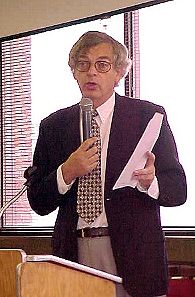
|
|
Rationalists' German speaker claims Resurrection not trueBy Jeannine F. Hunter, News-Sentinel staff writerOctober 19, 2002
German theologian Dr. Gerd Luedemann will lecture on "The Great Self-Deception: Paul, the Founder of Christianity" at 10:30 a.m. Sunday, Oct. 20, at the Candy Factory. The New Testament scholar's visit is sponsored by the Rationalists of East Tennessee. The organization provides fellowship and community education for people who "support free inquiry and the exploration of ethical and intellectual alternatives to supernatural belief systems." Luedemann rejects the theology of the Virgin Birth and Resurrection. He has written several books on the Resurrection of Jesus and many other studies in the New Testament and early Christianity including "Heretics: The Other Side of Early Christianity." "The Great Deception: What Jesus Really Said and Did," was rejected by numerous Christian publishers because Luedemann outlined why he declared he no longer affiliated with Christianity. "I said the church has no basis for its teaching and that nobody has a right to call themselves a Christian, and I called myself no longer a Christian because Jesus didn't rise," Luedemann said in a telephone interview from Nashville where he's spent the past semester as a visiting scholar at Vanderbilt Divinity School. Luedemann, 56, is on leave from the University of Goettingen where he's taught for two decades. He will return to Germany within the next two weeks to resume teaching courses on early Christianity history and literature of early Christianity. When asked what he called himself, Luedemann said, "You could call me a secular humanist. I am not an atheist. ... You cannot deny God. We, as humans, we cannot deny what is greater than us. I am an agnostic secular humanist." In 1998, Goettingen University declared that Luedemann's views disqualified him from teaching ministerial students. School officials reassigned him to chair a newly assigned discipline, "History and Literature Early Christianity." He sued over his dismissal and sought to reclaim his full teaching status. The controversy intensified when Luedemann penned the book, which concluded the Resurrection had not taken place. "The church saw it (book), and I said that Jesus' body rotted in the tomb, and it was picked up in the newspapers. I had to respond to the discussion," he said. He said was protected from being fired because "the government said if somebody has an opinion, he or she cannot be punished for it" yet he was "deprived of every academic right." As for the theology that spread after Jesus' death, Luedemann said, "Self deception. The disciples believed that he rose, but modern scholarship deduced that he hadn't. It was a Jewish sect that turned it into a world religion... I studied the disciples, but, without Paul, it would have remained a very little sect within Judaism." Luedemann said some of his peers in Germany have called him "a self-declared heretic. They know that what I say is based on scholarship. As an historian I cannot accept metaphysical or supernatural claims." Jeannine F. Hunter may be reached at 865-342-6324 or hunter@knews.com. Get Copyright Clearance Copyright 2002, Knoxville News-Sentinel Co. Copyright © Gerd Lüdemann Letzte Aktualisierung am 22. April 2020 |
|
|
